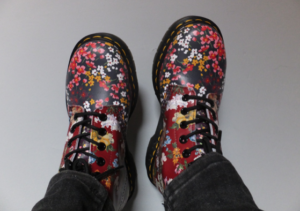

Vegan Venture
by Margaret Downey on the 01/06/2017
Development Perspectives “Vegan Venture challenge” proved more difficult than I expected. As a way of highlighting the impact of meat production on Climate Change we were asked to live a vegan lifestyle for one week. I eat mainly vegetarian food and occasionally fish and chicken, so I presumed I would have little or no problem cutting out the additional extras. I missed cheese, eggs, natural yogurt, fish and brown bread mostly. There are many alternative substitutes for each of these products however, I felt that it would take a little bit of time to research the healthy options. Personally, white doughy sliced pan is not a viable alternative to brown bread and occasionally I found myself buying a bag of greasy chips to snack on, which is not the norm for me. I questioned why it would be considered unethical to eat eggs from organic chickens; surely, they produce eggs naturally so why not avail of them? And what’s wrong with consuming milk from a healthy organic cow/goat… if they produce milk then why not use it? This blog is a simple reflection on some of my findings.
Organic and free range egg production

To answer my question regarding organic eggs; I learned that hens in their natural state lay eggs until they have a full nest. At this point, they would naturally stop laying eggs and start nesting. The egg industry interrupts this natural process by removing the eggs, therefore constantly encouraging the chickens to lay more eggs to fill their nest. Even organic and free range hens are left in a state of constant laying if their nest is never full.
The laying of every single egg involves great effort on the hen’s part. In intense farming situations, some chickens die in the process as result of the pressure on their laying organs. Even though the life of an Organic hen is better than a Free-Range hen and considerably happier than a hen doomed to battery fate, the process of taking their eggs for our consumption results in the same principle of pressure to keep producing.
Battery Hens
A friend of mine recently adopted 3 hens from a farm sanctuary. Not only did she save the hens from horrible conditions and a gruesome death, but also allowed the farm sanctuary more space for other chickens in need of rescue. On meeting the adopted chucks, I was choked at how disturbing their appearance was; practically bald of feathers and covered in blue disinfectant. Battery hens live in a cage so small they cannot stretch their wings. Forced to stand night and day on a wire mesh producing up to 4 eggs daily. Part of their beak is sheared off with a hot iron to prevent aggressive pecking behavior which is guaranteed in such a stressful, anxious environment.
Annual poultry supplies in Ireland are roughly 70 million chickens, 2 million hens of which are yielding eggs and 4 million turkeys. Ireland is the highest consumer of poultry meat in the EU while at the low end of the egg consumption scale.
Cowspiracy

Cowspiracy: The Sustainability Secret is a 2014 documentary produced and directed by Kip Andersen and Keegan Kuhn. The film explores the impact of animal agriculture on the environment, and investigates the policies of environmental organizations on this issue. Environmental organizations investigated in the film include Greenpeace, Sierra Club, Surfrider Foundation, Rainforest Action Network. As part of the “Vegan Venture” challenge SDG goal 13, Development Perspectives recommended that we watch this documentary. According to the food and agriculture organisation of the United Nations, animal agriculture is responsible for 18% of greenhouse gas emissions, more than the combined exhaust from all transportation.
More recently, an article appeared in The Economist titled; Why eating more vegetables is good for the environment. The article outlined that by following a modest meat diet, global greenhouse gas emissions were found only to increase 7% by 2050 (compared with an expected increase of 51% according to projections from the status quo). A widespread switch to vegetarianism could curb emissions by nearly two thirds and veganism by 70%. It felt good to be place myself in the vegan category whilst reading this article.
Dairy production
Back to my question about utilising the milk produced by an organic cow.
To keep producing milk for humans, dairy cows must become pregnant and have calves. On the larger scale this is done forcibly, typically through artificial insemination. Calves are generally separated from their mothers within 24 hours of birth, causing huge distress to mother and baby. Organic milk is slightly better than non-organic, but the main problem is that cows must be kept pretty much continually in calf, and the calf must be taken from the mother shortly after birth if we want to avail of the milk. This happens whether the cow is living happily in a buttercup meadow or merely existing in a crowded dairy farm.
The Reality?
Through my small bit of research I realised there were huge discrepancies between what environmental organisations were saying regarding dairy and meat production and what independent researchers were uncovering. And then of course there’s quotes like the one below that made me question why I would ever consider eating animal products or categorising them into a happier place for my conscience to reside.
“Organic, “natural,” “humane,” and “free-range” eggs, milk, and meat are filled with artery-clogging saturated fat and cholesterol, just like conventional meat, milk, and eggs. Study after study links the consumption of animal-derived foods to heart disease, cancer, and other serious health problems. And because organic and “free-range” animals are usually raised in crowded conditions and killed in the same filthy, excrement-ridden slaughterhouses as animals from factory farms, their flesh may also be contaminated with bacteria and other pathogens”
Seduced by leather

My greatest failure during the Vegan Venture was my vulnerability to being wooed by a pair of exotic looking leather Docs. They beckoned me from the small shop window and considering our new pup had recently devoured my beloved Birkenstocks, I felt entitled to buy them. We often feel “entitled” to treat ourselves to whatever is within our reach, without considering the consequence of our action. Without considering the effect of our consumption on the environment and the treatment of animals and people in the process of stocking the shelves with such shiny items of indulgence. Plump chicken breast pumped with hormones, blood red hunks of beef pulsating with testosterone, designer leather handbags and shoes to give credibility to our fashion sense. How often do we succumb to such temptation? And what drives this temptation? why do we place value on products that are fundamentally rooted in cruel and unfair practices that ruin the environment we live in?
Conclusion
Veganism is about healthy, logical, and compassionate choices, a greater awareness, and common sense. It becomes a lifestyle; a lifestyle based on having a conscience and recognising that every time you decide to consume or purchase an animal based product or one that is tested in animals, you have by choice contributed to the cruelty to animals and climate change.
Can I live with my contribution?
0 comments
No comments on this blog yet. Would you like to be the first?